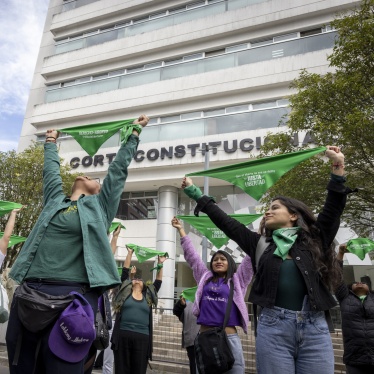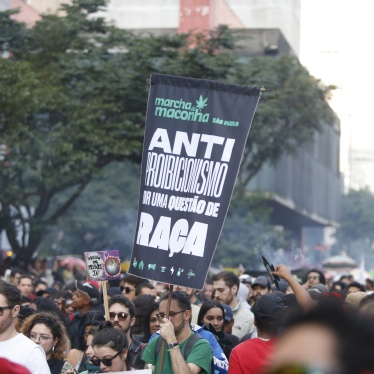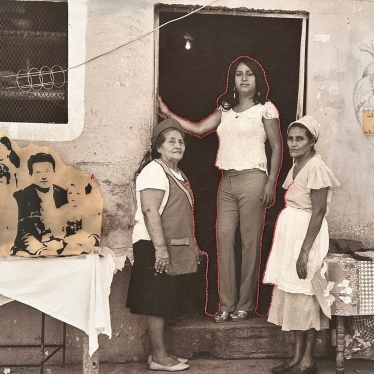(Washington, DC) – Peruvian President Martín Vizcarra should veto a bill that would grant a conditional release to former President Alberto Fujimori, Human Rights Watch said today. The bill, passed by the Peruvian Congress on October 12, 2018, is a thinly veiled effort to free Fujimori disguised as a prison system reform.
The bill grants prisoners who are over a certain age and have served a third of their sentences the right to serve to the remain under “electronic surveillance.” Fujimori supporters in Congress introduced the bill six days after a Supreme Court judge overturned a December 2017 pardon that led to Fujimori’s release. The bill rocketed through Congress, passing only three days after it was introduced.
“Since their plan to ensure Fujimori’s freedom through a pardon is crumbling, Fujimori supporters are moving forward with a ‘plan b’ to guarantee that their political chief doesn’t go back to prison,” said José Miguel Vivanco, Americas director at Human Rights Watch. “Proponents of the bill say it’s intended to ease prison conditions for elderly prisoners, but the timing and language in the bill show that its objective is to ensure the freedom of an autocratic former president convicted of serious human rights violations.”
Fujimori was sentenced in 2009 to 25 years in prison for human rights violations, including two abductions, the enforced disappearance and murder of 9 students and a teacher from La Cantuta University, and the extrajudicial execution of 15 people in the Barrios Altos neighborhood of Lima. The Supreme Court ruled that these were crimes against humanity.
In 2017, President Pedro Pablo Kuczynski granted Fujimori a humanitarian pardon. The pardon appeared to be the result of a politically motivated decision that lacked fairness and transparency. There are strong reasons to believe that the release was the result of a negotiation by Kuczynski’s government in response to growing pressure from Fujimori supporters in Congress, including an attempt to impeach Kuczynski.
On May 30, the Inter-American Court of Human Rights (IACtHR), the main human rights court in the Americas, analyzed Fujimori’s pardon. The court ruled that releasing people convicted of serious human rights abuses could be compatible with Peru’s duty to investigate, prosecute, and punish abuses, provided the release was “strictly necessary” to ensure a prisoner’s right to health. It suggested that the Peruvian courts should examine the pardon, pending an IACtHR examination.
On October 3, a Supreme Court judge concluded that Fujimori’s “humanitarian pardon” was inconsistent with Peru’s international human rights obligations, and ordered that Fujimori be sent back to prison. An appeal is pending, and Fujimori has not been sent back to prison.
Fujimori’s detention conditions, the judge found, did not pose a risk to his health. He was held in a prison that was “virtually exclusive” for him and had “large rooms,” 24-hour nursing services, and no restrictions on visits. Whenever he was sick, the authorities allowed him to visit the hospital of his choice, the judge said.
The new bill specifies several categories of prisoner who can be freed. Among these are male prisoners who are more than 78-years-old and have served a third of their sentence. Fujimori, who is 80, has served 10 of the 25 years of his sentence.
The beneficiaries can serve the remainder of their time under “electronic surveillance,” with their movements limited to the province in which they choose to live. Defendants can leave their province provided they “inform” authorities of Peru’s prison system and offer a “guarantor” who, the bill says, could face “criminal responsibility” if the defendant does not return to the province in time. The bill excludes people convicted of certain crimes, including treason, aggravated drug trafficking, and terrorism, but not any of the extremely serious crimes Fujimori was convicted of.
The bill also states that authorities cannot overturn the release if a beneficiary is charged or convicted again for “crimes committed in the past.” Fujimori is currently facing a criminal prosecution for the 1992 killing of six men in the Lima district of Pativilca by members of the “Colina” death squad, which was active under the Fujimori administration. Additionally, in April, a prosecutor requested that he be charged in connection with the forced sterilizations of hundreds of women, most of them poor or indigenous, during his administration.
Under Peruvian law, until now, the conditional release of prisoners has been granted by judges. The new bill transfers this power to the chief of the prisons’ system.
Under international human rights law, governments have an obligation to ensure real accountability for serious human rights violations. But serious illness can transform an ordinary sentence of incarceration into an ordeal that is cruel and punitive to a degree that outweighs the need for a specific punishment. Release for people convicted of even the most serious crimes may be warranted under these circumstances.
People convicted of atrocities can also benefit from conditional release rules available to other convicts, provided that the justice delivered remains proportionate to the gravity of the crimes.
Human Rights Watch has said that releasing Fujimori would be consistent with international human rights law, as long as he was not granted special treatment. But the bill that has been presented for the president’s signature is a thinly concealed effort to grant him special treatment, under the guise of a broader reform.
“A law that helps improve human rights conditions for prisoners, including those responsible for serious crimes, would be a positive step,” Vivanco said. “But that’s not what this bill is about – it’s about betraying victims’ rights to benefit a powerful man responsible for atrocious crimes.”








